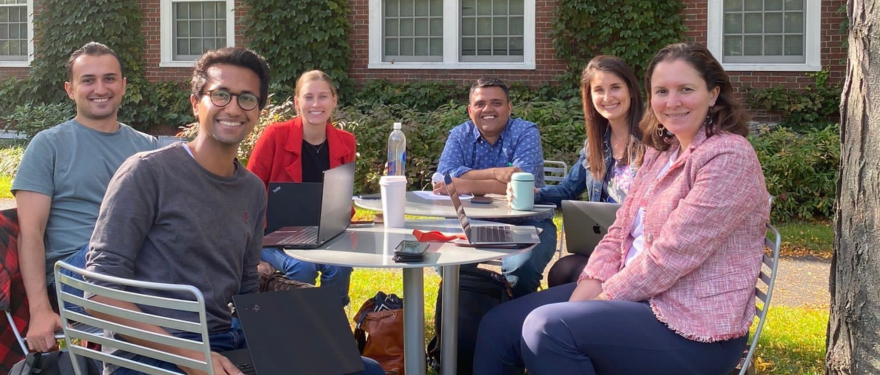On March 24, five teams of Harvard students came together to pitch innovative impact investment opportunities in early-stage social enterprises. The students were participants in a hands-on impact investing program called Turner MIINT (MBA Impact Investing Network and Training). Students across Harvard Business School and Harvard Kennedy School joined together in teams of 5-6 students, sourced investments in high-impact startups, and conducted due diligence on the business opportunity, financial returns, and social and environmental impact. The MIINT program provided detailed trainings to help students take on the role of an impact investor, walking them through topics such as how to measure impact or how to analyze a term sheet. MIINT at Harvard is organized by the HBS Impact Investing Club and HBS Senior Lecturer Brian Trelstad, a co-founder of the MIINT program who serves as the Harvard MIINT faculty mentor.
The five teams of Harvard students pitched investment opportunities across various sectors and geographies, from an anti-bully EdTech startup in Latin America to a cultivated meat company focused on sustainable pet food in the US. Ultimately, the winning team from Harvard presented Kumulus, a Tunisian startup that provides an innovative water purification device for the MENA region. The team included three students from HBS (Katjana Kammin, Vugar Abdullayev, and Vaibhav Sharma) and three students from HKS (Swapan Mehra, Rym Baouendi, and Emily Nyrop).
After winning the Harvard internal competition, the Kumulus team competed in the Global MIINT Semifinals and Finals against 40 other MBA programs vying to receive a $50,000 investment in their company. The competition was judged by a panel of experienced impact investors who asked detailed questions on the students’ due diligence. The Kumulus team was ultimately selected as runner-up in the competition and won a $25,000 investment in Kumulus.
Students chose to participate in MIINT to gain hands-on experience in impact investing, strengthen their skills and explore it as a potential career path. Vaibhav Sharma (MBA 2023) shared his experience: “I joined the MIINT competition to learn how I could capitalize on my background as an investment professional to drive impact in emerging markets. The experience enabled me to gauge societal and community impact as well as learn about innovative business models solving critical challenges.”
Katjana Kammin (MBA 2023) further highlighted the need for more students to focus on impact investing: “Especially in emerging markets, entrepreneurs face critical challenges that require patient capital and creative solutions.” Students from HKS also found MIINT a valuable learning experience. Swapan Mehra (MC/MPA 2022) explained “I have a background in climate project finance and policy and felt that MIINT would help me enhance my repertoire of skills. I learned about the process of innovation selection, due diligence and investment evaluation.”
MIINT participants also enjoyed connecting with the impact investing community, both within and outside of HBS. Laura Romine (MBA 2023) shared her experience: “MIINT was one of the most impactful experiences I have participated in so far at HBS. I really enjoyed working with other impact-focused students and hearing about their experiences. The MIINT program also provided an avenue to reach out to impact VCs and ask their perspective, which gave me a stronger sense of the different paths founders and impact investors have taken and ultimately what drives my passion for the space.”
Finally, the MIINT teams developed strong bonds and community. Vugar Abdullayev (MBA 2023) explained: “I am very thankful for the diverse team from HBS and HKS for the hard work, cooperation and fun! I am also grateful for the impact investing community of Harvard for providing learning resources and supporting us during the competition.”
The HBS team’s second-place finish underscores the program’s ability to equip students to become capable impact investors. Through participating in MIINT, business students can learn about mission-driven companies, make connections in the field, and gain hands-on experience to prepare them for their future careers.
This article was originally published on the HBS Social Enterprise Initiative blog.

